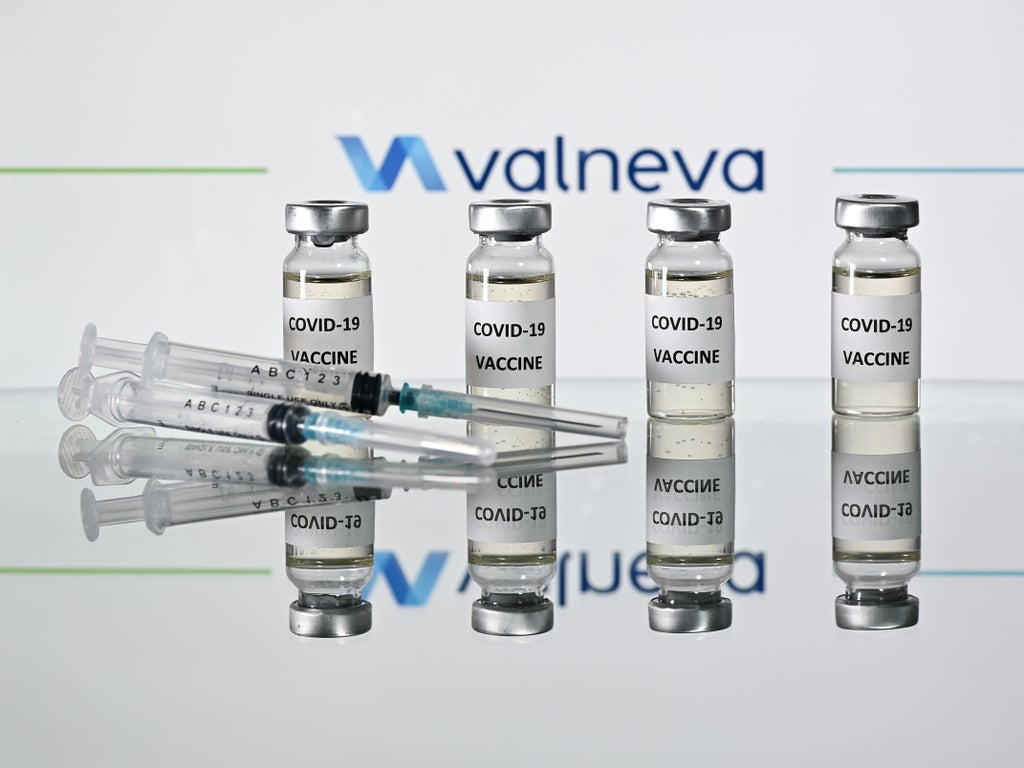
A Covid-19 vaccine developed by Valneva has been given regulatory approval by the medicines regulator, making it the sixth jab to be granted authorisation in the UK.
It marks yet another significant milestone in the fight against coronavirus, coming less than two years after scientists first started developing Covid vaccines.
The UK’s medicines regulator is also the first in the world to approve the Valneva vaccine, which will be manufactured in a factory in Livingston, near Edinburgh, among other sites.
So, what do we know about this latest vaccine?
The technology
It differs from the Pfizer, Moderna and AstraZeneca jabs in that it uses an inactivated but preserved form of the virus to trigger an immune response in recipients.
Inactivated vaccines are a well-established technology that has been used over the last seventy years to vaccinate billions – including for seasonal flu, polio and rabies.
Compared to the mNRA and adenovirus vector vaccines which train the immune system to specifically target the spike protein of the Covid virus, the Valneva jab appears to trigger a wider and more diverse immunological response against additional SARS-CoV-2 proteins.
“The data show viral-neutralising antibody responses that are, on average, higher than those to the licensed AZ vaccine,” said Adam Finn, a professor of paediatrics at the University of Bristol and chief investigator of the Valneva vaccine clinical development programme in the UK.
The vaccine also contains a novel adjuvant, called CpG, which is a substance that increases the size of a recipient’s immune response.
Effectiveness and side effects
In its phase three trial, the vaccine induced broad T-cell responses against the S, M and N proteins of SARS-CoV-2, which all play different roles in the functioning of the virus.
“Antibody responses – at least post priming doses – are as good as or better than AZ [AstraZeneca],” said Prof Finn. “T cell responses to several viral antigens are observed – the importance of these for protection are not yet known. Evidence on effectiveness against infection and severe disease will only become available once the vaccine has been widely used.”
As such, authorisation for the jab was based on safety and immunogenicity data from the company’s trial studies. “To get MHRA authorisation, it’s safe to say data need to be robust,” said Prof Finn.
According to the data, the vaccine is less reactogenic than the mRNA and adenovirus vector vaccines. This means it causes less short-term side effects, such as sore arms, headaches and fevers.
Lab studies have also demonstrated the ability of the vaccine to effectively neutralise the Omicron and Delta variants, raising hope that it could provide a solid wall of defence against future strains.
Availability
The UK had been due to receive 100 million doses of the French firm's jab, but the government cancelled the deal in September due to a "breach of obligations". As such, it’s “unlikely to be available in the UK in the near future,” said Prof Finn.
The former chairwoman of the country's vaccine task force last year said the government may have "acted in bad faith" in the way it cancelled the deal for the vaccine.
Dame Kate Bingham, who stood down from her role at the end of 2020, criticised the decision to pull out of the agreement before Valneva had finished clinical testing of the vaccine.
Nonetheless, with approval for the jab coming through, the government now at least has the option to strike a new deal with Valneva and place an order for doses.
Whether the UK needs any further vaccine supplies is another matter, but Prof Finn said “it’s a good idea to have several types of vaccine and several vaccines of each type.”
He added: “This increases supplies, increases alternative supplies (so reducing unexpected shortages), increases the numbers of options in terms of effectiveness over time and safety as experience grows.”
And remember, if the government was to decide it wanted to start rolling out the Valneva jab, it’d need to get the green light from the Joint Committee on Vaccination and Immunisation first.
“Personally I do not think it will find a lot of use in the UK as the vast majority of people in the UK have either been vaccinated with what appears to be more effective vaccines or had at least one Covid infection and many have had both vaccine and an infection,” said Paul Hunter, a professor in medicine at the University of East Anglia.
“It may find more use in low income countries because it is likely to be easier to store and transport than some of the other vaccines.”







